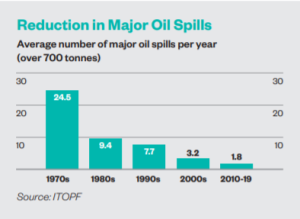Defending the Global Pollution Liability Regime 2020
Ships often operate in difficult, sea conditions which present, a high degree of physical, risk, and despite tremendous, improvements to the industry’s, safety performance, it has not, yet been possible to eradicate, maritime casualties completely.
Over the past decade, there have been, on average, two serious oil spills (over 700 tonnes) each year worldwide. This is still two too many, but there were some 30 such spills per annum in the 1970s when the volume of maritime trade was a fraction of that carried in 2020. Major incidents today are much less frequent due to improved ship designs and strict implementation of safety management systems on board, supported by a comprehensive framework of IMO regulation. Nevertheless, oil spills from ships can still have devastating consequences for those affected. Over the past 50 years, a very successful global system has therefore been developed by IMO Member States to provide compensation for oil pollution damage.
The IMO Civil Liability (CLC) and Fund Conventions (as well as other IMO liability Conventions) have been remarkably effective in providing those affected by oil spills with prompt compensation without protracted legal wrangling.
Importantly, the shipowner’s contribution is paid regardless of fault, and on the very rare occasions that claims have exceeded the shipowner’s liability under CLC, additional compensation is provided by the International Oil Pollution Compensation Fund (IOPCF) financed by oil importers. The quid pro quo for shipowners’ acceptance of strict liability is that this is limited to a level that allows the shipping industry to obtain access to the necessary cover through its third party liability insurers, principally members of the International Group of P&I Clubs.
In countries that have signed up to the 2003 IMO Supplementary Fund Protocol, over US $1 billion is available to cover the cost of clean-up and to compensate those affected by any single cargo spill.

In recent years, however, the stability of this impressive global system has been severely threatened by decisions of national courts and domestic legislation that are inconsistent with the fundamental principles of the IMO CLC and Fund Conventions.
This has included cases where the shipowner has been denied the right to limit liability for politically motivated reasons. Cumulatively, such decisions cause increasing uncertainty and disturb the delicate balance of interests on which the international compensation regime is based. Therefore, in co-operation with the International Group of P&I Clubs (IG), ICS has been vocal in stressing the importance of ensuring the consistent interpretation of the IMO liability and compensation Conventions.
In 2019, a proposal submitted by Greece and the Marshall Islands, co-sponsored by ICS and the IG, to develop a Unified Interpretation of the test for breaking the shipowner’s right to limit liability under the IMO Conventions, received overwhelming support from governments at the IMO Legal Committee.
Work began immediately in a Correspondence Group of interested IMO Member States, co-ordinated by ICS and the IG. Extensive research conducted by the P&I Clubs clearly established that the intentions and objectives of the drafters of the Conventions, at the time of adoption, was that the test for limitation of liability should be virtually unbreakable, and that this concept was adopted by IMO Member States as part of a package that included higher limits of liability than were previously available, and which were linked to the insurability of the risk at a reasonable cost.
The results of this intersessional work were detailed in a submission to the IMO Legal Committee meeting scheduled for March 2020, co-sponsored by Canada, Greece, Italy, Malta, Poland, ICS and the IG. The new submission recommended that a draft Unified Interpretation should be developed for presentation to the subsequent Legal Committee meeting, and that it should be based on the principles established when the IMO Conventions were adopted.
While the March 2020 Legal Committee was postponed due to COVID-19, this matter will be high on the agenda once Legal Committee meetings resume. An interpretive tool developed by IMO should be extremely helpful to national courts and those tasked with drafting national legislation, to provide a better understanding of the intended application of the IMO Conventions. It is hoped that this will lead to greater uniformity and certainty and, most importantly, will ensure the long term future sustainability of the international compensation regime and the overall benefits that this will provide to any future claimants.
Related content

FuelEU Maritime – Avoiding Unintended Consequences

Environmental Performance: Reduction in the Quantity of Spilled Oil

Fourth Propulsion Revolution: ICS reaches beyond the shipping community
